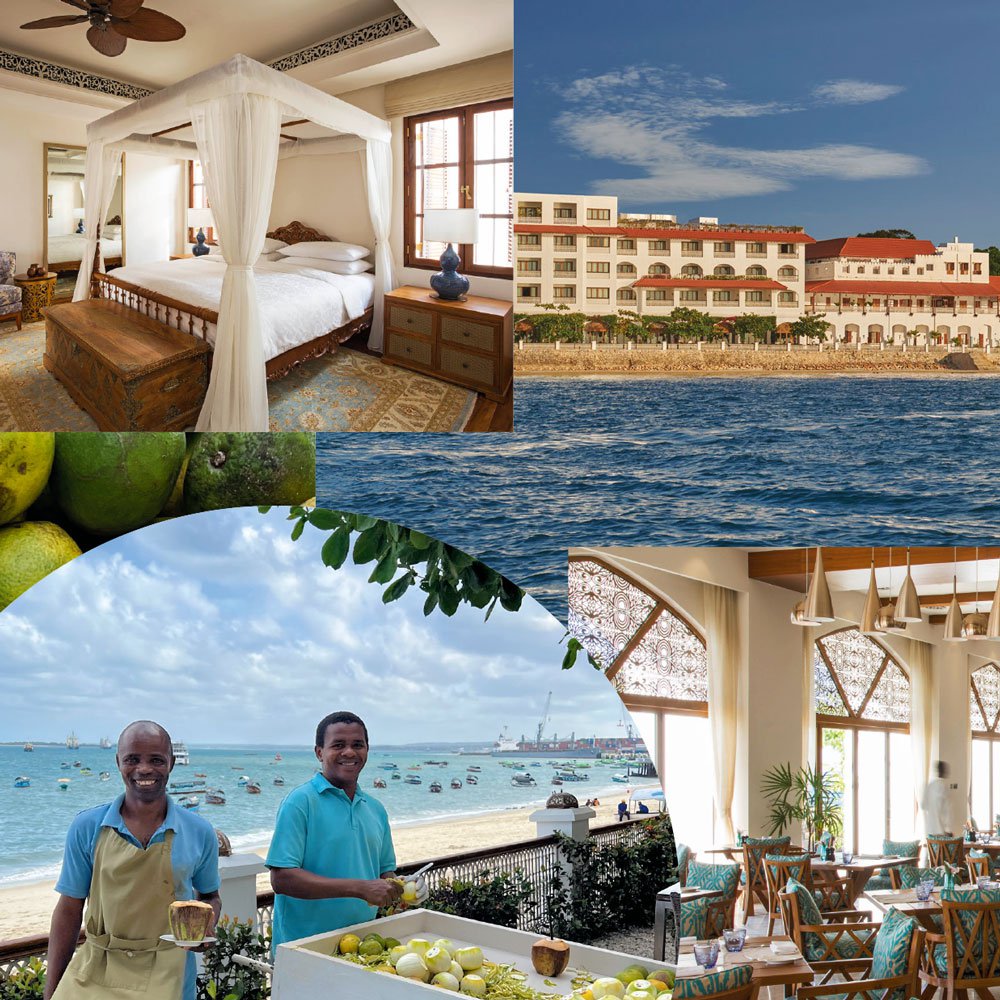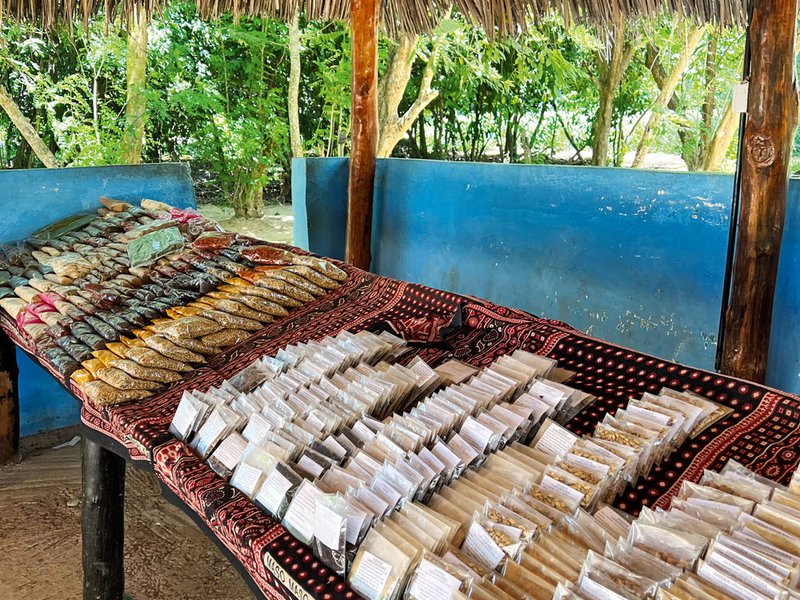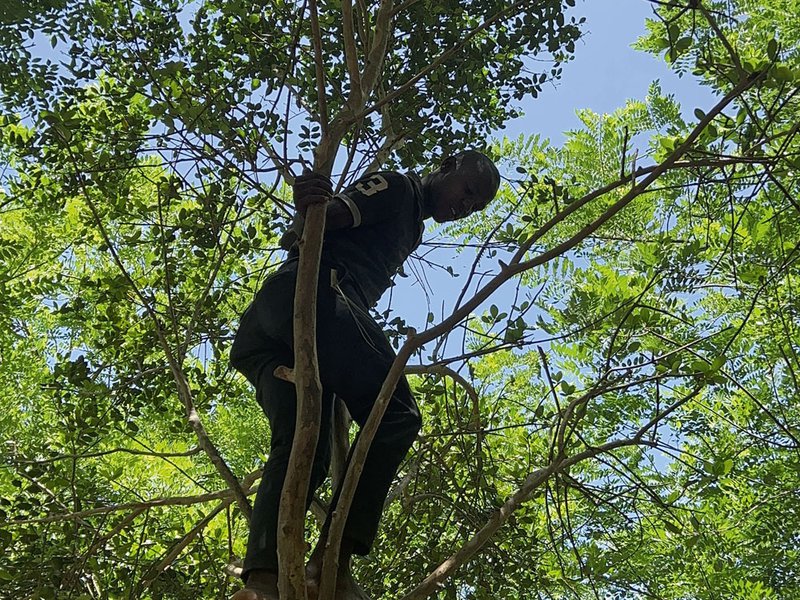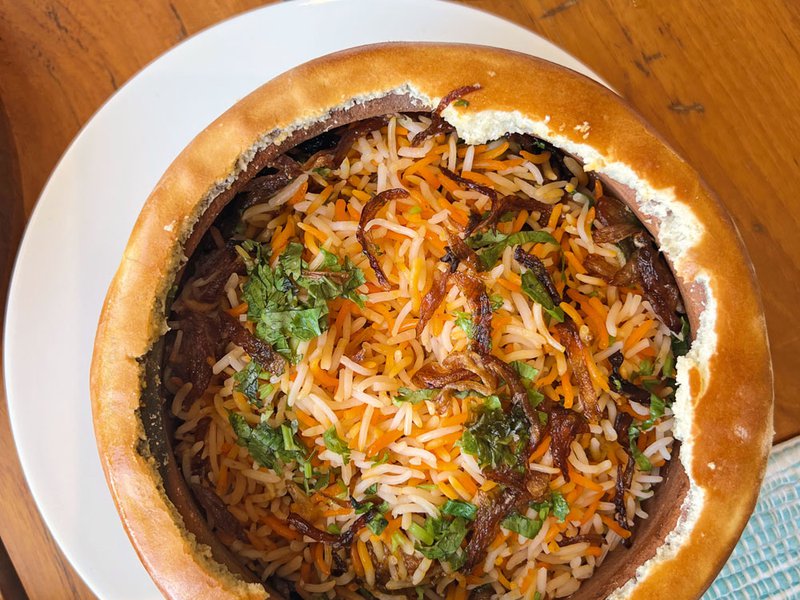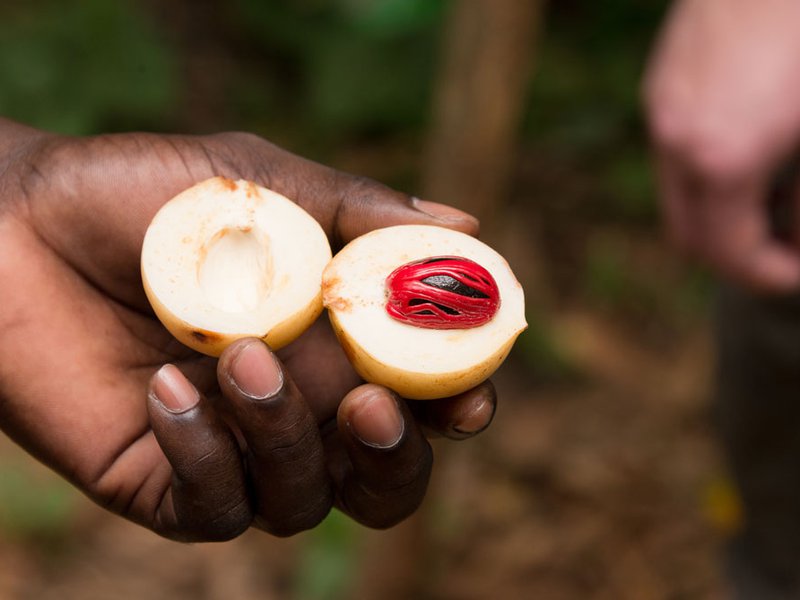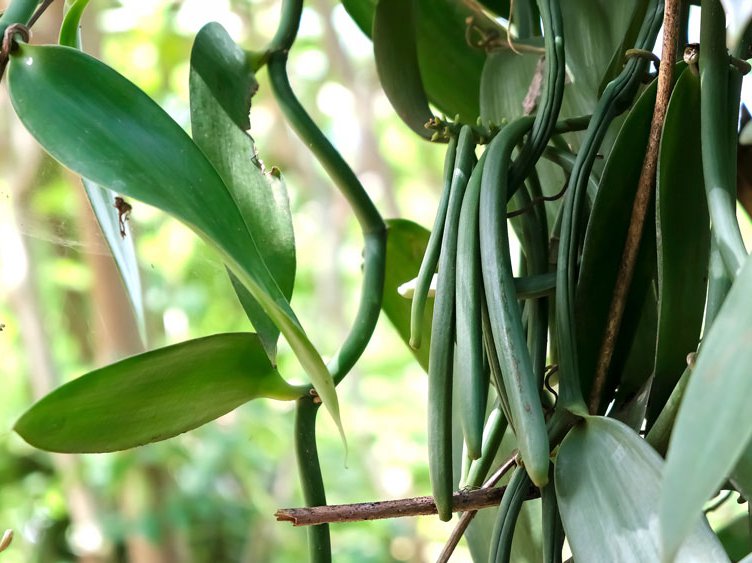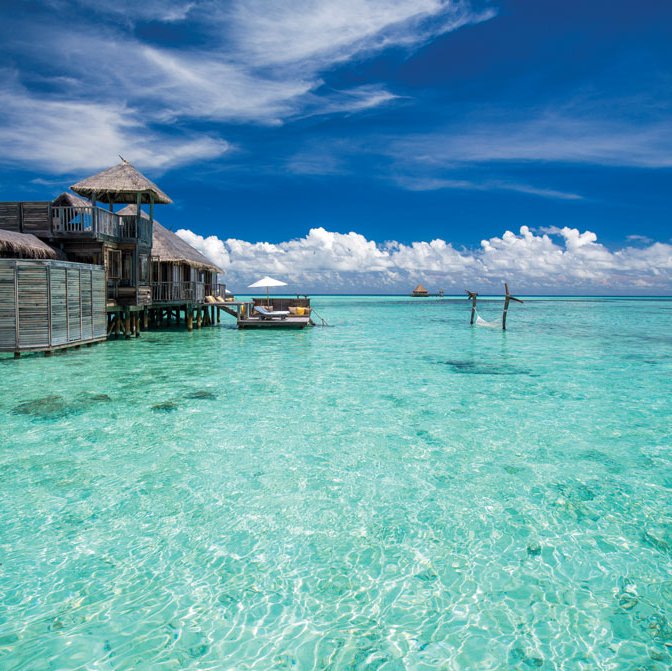Zanzibar is one of those names that conjures extraordinary and exotic images. Its layered heritage includes influences from all over including India, Portugal, and Oman whose sultans turned the archipelago (which includes Pemba) into an epicentre of trade. Over the centuries, a bounty of tropical fruits and spices were introduced to the islands and fertile growing conditions meant prosperous growth. Our content director Tiffany Eslick recently journeyed to the capital Stone Town – where her stay at Park Hyatt gave her a glimpse into the nation’s past, its welcoming and proud people and diverse cuisine
PARK HYATT ZANZIBAR
Legend has it that it was Zanzibar’s first Sultan, Sayyid Majid bin Saïd al-Busaidi who sourced the seeds for the Muyuni mango tree that sits in a serene courtyard between the Park Hyatt’s Mambo Msiige and Zamani Residences in the heart of Stone Town. The former is a building that’s charted the island’s history for more than 100 years; the mid-19th-century mansion with ornate doors was built by a wealthy Omani trader and has been respectfully restored. The latter is a modern wing – but one that has been sympathetically designed. Together these stately structures sit above the white sands of Shangani Beach, offering alluring views of the ocean from a sweeping terrace, guests’ private balconies or a perfectly positioned infinity pool.
The hotel’s location is also ideal for those wanting to explore the World-heritage listed Stone Town. It’s just steps from Forodhani Gardens, the House of Wonders, the Arabian Fort and the bustling harbour.
When leaving or returning to the hotel, you’re sure to pass the magnificent mango tree. An artist in residence paints under its shade, and like the tree itself, any of their works would keep Zanzibar memories close by.
SUPPORTING LOCAL
Working with the artist (who also offers art classes), is just one of many examples of how the Park Hyatt supports local initiatives. In fact, doing so is always top of mind for the brand – especially when it comes to its F&B focus.
“We always look around our properties, drawing inspiration from culinary influences of where we are,” says Nicolas Cedro, the hotel’s GM. “This is important for so many reasons. In terms of food, freshness and taste are just two. There’s a richness in Zanzibar – and we must promote this,” he adds.
It’s Zanzibar’s street-market set ups, the abundance of produce, quality spices and unique local recipes which steered Nicolas and his team of chefs in a strong direction – of making and presenting delicious dishes, in a creative way, while empowering small entrepreneurs from the community.
“It’s important that our guests are able to meet our suppliers, too,” says Nicolas. At breakfast, Juma and Al-Haji start everyone’s day with beaming smiles, while they prepare fresh drinking coconuts and zesty oranges respectively. Previously street vendors, both men have been able to improve their family’s futures because of their partnerships with Hyatt. Side note: Juma’s coconuts are served with local spice syrups. And adding cinnamon to coconut water is possibly my current flavour combination.
There’s also the Barefoot Mamas of Zanzibar from whom the hotel sources honey. Sales of this go towards building solar panels in villages. And organic fruits and many vegetables are provided straight from a nearby farm by Fatma of Green Groceries Zanzibar.
Perhaps the most encouraging story is that of Saleh, a fisherman who has worked with the hotel since it started. He’s grown his fleet from one dhow to nine now – thanks to the demand from Park Hyatt, its offsite restaurant Beach House and its separate in-flight catering business on the island. He continues to work in a sustainable manner as it’s important to him to protect what his home offers, for generations to come.
THE FOOD, OH THE FOOD!
For someone who wants to try Zanzibari specialties, it’s quite possible to satiate that need without stepping foot outside the Park Hyatt. Of course, I’m not encouraging a lack of exploration.
Post cinnamon-infused coconut, I started each morning on the Dining Room’s terrace, under a canopy of Indian almond trees, relishing a big bowl of Urojo. This comforting traditional soup comes with chicken mishkaki (skewers), kachori (fried lemon and chilli potato balls), bajiya (mung bean falafel), coconut chutney and crispy cassava chips. It sounds heavy – I assure you it’s manageable – and there will still be room for freshly baked bread with a dollop of passionfruit jam, fruits cut à la minute and a delicious cup of Tanzanian coffee. Oh, and dosas – you can’t skip these.
Lunch and dinner are both good occasions to dine at the hotel’s on-site outlets – and its sister restaurant, The Beach House, helmed by Italian chef Popi, nearby.
Obviously fresh fish and seafood feature heavily across all the menus. It’s also only fitting that some, or as much of Saleh’s daily catch be tried.
"Stand-out dishes for me include a seafood paella – the recipe comes from Nicolas’ mother-in-law and is one that was a hit under his tenure as an acclaimed chef in Spain. (It’s always a bonus when the GM has a culinary background). The rock lobster bisque with cinnamon-scented foam and ravioli was subtle and smooth. And the Tanganyika Fisherman’s Seafood Platter looked exquisite with its bounty of lobsters, prawns, snapper, calamari, and reef coral cigales. The latter, with their sweet meat, were something new for me to try. And everything, from snapper and passionfruit ceviche to seared Yellowfin tuna, a Portuguese seafood vindaloo to a succulent black-pepper-crusted steak is treated simply, but superbly. “That’s because I want my chefs to always respect the product,” says Nicolas.
Watching the sun sink into the Indian Ocean from the hotel’s veranda – or at Beach House where DJ El Brown spins Afro-house beats is de rigeur from 5pm onwards. And for dessert? “Always the cheesecake,” says Nicolas. “It’s the best”.
For someone who wants to try Zanzibari specialities, it's possible to satiate that need without stepping food outside Park Hyatt
EXPLORING
Visiting a spice farm may sound too much of a tourist-trap to some, but let the Park Hyatt organise this for you – and it will be an insightful and memorable excursion. I met Yussuf from Zantours through this experience – an ardent historian who lives to share information about his country – the only place, beside Mecca, he ever dreams to be. “When it comes to this island, I’ve left no stone unturned,” says Yussuf. “I know everything – but take me away, and I know nothing.”
Together we visit Zito farm: a small-scale “plantation” with a bounty of treasures including ginger, lemongrass, turmeric, allspice, cardamom, pepper, cinnamon, nutmeg and cloves. The latter, Yussuf says, came from Indonesia. “No spice is more important to Zanzibar than cloves,” he adds. They’re mainly grown on Pemba Island due to prosperous growing conditions.
I learnt that vanilla and pepper are both parasite plants; that cinnamon is known as the queen of the spices and every part of this tree can be used, including the root – which has a strong eucalyptus scent. This is great for steaming when you have the flu. Nutmeg and its fuschia-pink mace case are both powerful ingredients.
“We have a saying,” says Yussuf, “no nutmeg, no wedding!”
One of his mottos is: “Whatever you learn today, don’t be satisfied with that – there will always be changes tomorrow and new things to learn.” With this in mind, I jumped at the chance to attend a cooking class with Park Hyatt’s chef Musa, to see what more I could find out about spices and how they’re used in traditional food. We started with samak wa kupaka (a Swahili favourite with grilled red snapper that’s coated in a coconut and tomato sauce with hints of coriander, cumin, ginger, garlic and lime. We also made a delicious Zanzibari style chicken biriyani – with layered Mbeya rice (produced in villages of Tanzania and a bit like sticky rice) that was topped with dough. Both dishes, though using an abundance of spices, were not too hot or overpowering, like almost everything I tasted during the trip. The cuisine allows so many flavours to each have their moment to shine.

Whether at Forodhani night market, or secreted away in back alleys, you’ll come across vendors selling green mangoes (some carved like flowers) that are covered with chilli salt. Pick up a bag and shake it well – this snack’s sweet-spicy combo of tangy fruit and hot seasoning is addictive.
Just about everyone who’s visited Stone Town will recommend Lukmaan Restaurant. Get there early and start downstairs by perusing counters filled with breads and baked goods, as well as the live cooking stations, before placing your order. The octopus curry, mbaazi (pigeon peas with coconut) and chapati are memorable.
Zanzibar’s favourite candy, known as ubuyu in Swahili, is made from baobab seeds (a superfood) which have been dyed red, sweetened. All you need to do is suck on them, but be warned, they leave a stained tongue, lips, and fingertips! Babu Issa’s are the best in town. Look for him nearby Lukmaan.
Somewhat like a passionfruit but super sour and with much bigger seeds, the mabungo fruit is a rare find, but, luckily Tanzania and more especially, Zanzibar is one of the very places it grows. In season, Mabungo is widely available at the markets. The pulp has a creamy texture and it’s juiced and sold fresh.
An outlier on the list as it’s not a food, but a cultural must – Bao is a traditional board game in East Africa which is fun to master. Ask anyone to teach you how to play– from the wizened men on streetcorners engaging in this pastime, to shop owners who sell the game’s artistically carved boards.
